Metabolic Summit: The Twin Epidemics of Obesity and Non-Alcoholic Fatty Liver Disease
You’re invited!
Join us for the next La Frontera Symposium event, hosted by the Long School of Medicine Office for Research.
7703 Floyd Curl Drive San Antonio, TX 78229, Medical Building, Pestana Lecture Hall 3.104A
What is La Frontera?
La Frontera is a symposium that brings distinguished speakers together from different backgrounds to attack a common problem from multiple angles. Our sole mission is to challenge conventional thinking to create greater impact.
Metabolic Summit: The Twin Epidemics of Obesity and Non-Alcoholic Fatty Liver Disease will dive into discussions and challenges about these major diseases plaguing our society, and the therapies being developed to fight them.
La Frontera Session Moderators
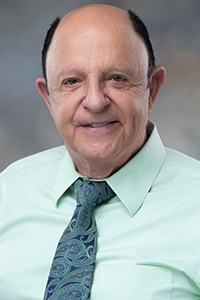 Ralph A. DeFronzo, MD
Ralph A. DeFronzo, MD
Professor of Medicine
Chief, Division of Diabetes
UT Health San Antonio Long School of Medicine
Dr. Ralph DeFronzo is directly responsible for many seminal advances achieved in diabetes over the last 50 years. He was a leader in developing the concept of insulin resistance, the defining characteristic of Type 2 diabetes, resulting in novel ideas about the development and progression of diabetes. He holds the Joe R. & Teresa Lozano Long Distinguished Chair in Diabetes in the Long School of Medicine at UT Health San Antonio, where he has been on the faculty since 1988. Dr. DeFronzo’s major interests focus on the pathogenesis and treatment of type 2 diabetes mellitus and the central role of insulin resistance in the metabolic-cardiovascular cluster of disorders known collectively as the Insulin Resistance Syndrome. Using the euglycemic insulin clamp technique in combination with radioisotope turnover methodology, limb catheterization, indirect calorimetry, and muscle biopsy, he has helped to define the biochemical and molecular disturbances responsible for insulin resistance in type 2 diabetes mellitus.
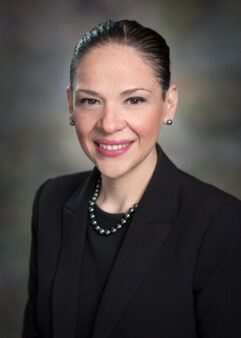 Carolina Solis-Herrera, MD
Carolina Solis-Herrera, MD
Associate Professor of Medicine
Chief, Division of Endocrinology
UT Health San Antonio Long School of Medicine
After completing her training in Internal Medicine, Endocrinology and an Advanced Diplomate in Nutrition and Obesity in Mexico, where she continues to be board certified; Dr. Solis completed a 4-year Postdoctoral Fellowship in Diabetes and Metabolism Research at UTHSA under the mentorship of Dr. Ralph DeFronzo. Her areas of interest include Pathogenesis of Diabetes, Mechanisms of Action of novel anti-diabetic drugs and Cardiometabolic Endocrinology. Dr. Solis-Herrera is passionate about education and service and has a Diabetes Teaching Clinic at the MARC. She supervises Clinical and Research Fellows, Residents and Graduate Students. She is actively involved with multiple local, national and international associations and is an active member of AACE, ADA and EASD. She also serves as Associate Editor of Diabetes Spectrum and is a member of the JDRF National Grant Review Committee.
Agenda
| Thursday, Dec. 8, 2022 | Topic | Presenter |
|---|---|---|
| 1:00 p.m. | Welcome | Dean Hromas, Dr. Ralph DeFronzo and Dr. Carolina Solis-Herrera |
| 1:10 p.m. | "Introduction to Neurohormonal signaling pathways and Anti-Obesity drug targets" | Carolina Solis-Herrera, MD |
| 1:30 p.m. | “Pathogenesis and Pathophysiology of NAFLD” | Sam Klein, MD |
| 2:00 p.m. | "The Many Ways to Create a Fatty and Fibrotic Liver: The Adiponectin/PPARƴ Axis" | Philipp Scherer, PhD |
| 2:30 p.m. | Discussion Table | Drs. Klein, Scherer, DeFronzo and Solis-Herrera |
| 3:00 p.m. | BREAK | |
| 3:15 p.m. | Innovations in Nonalcoholic Fatty Liver Disease: From Noninvasive Tests to Drug Development | Naim Alkhouri, MD |
| 3:45 p.m. | The Transcriptional Control and Metabolic Significance of Zonal Metabolic Pathways in Liver | Luke Norton, PhD |
| 4:15 p.m. | What’s GUT got to do with IT? | Marzieh Salehi, MD, MS, FACP |
| 4:45 p.m. | Discussion Table | Drs. Alkhouri, Norton, Salehi, DeFronzo, and Solis-Herrera |
| 5:15 p.m. | Closing remarks | Drs. DeFronzo and Solis-Herrera |
| 5:30-6:30 p.m. | Wine and Hors d'oeuvres Reception, Pestana Hall |
Featured Speakers
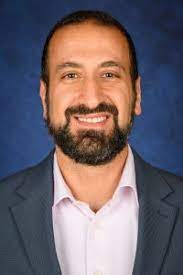 VP of Academic Affairs
VP of Academic Affairs
Chief of Transplant Hepatology
Director of the Fatty Liver Program at Arizona Liver Health
Faculty Member of the American Gastroenterological Association
Biography
Dr. Alkhouri’s specialty interests include nonalcoholic fatty liver disease, metabolic liver diseases, viral hepatitis, autoimmune hepatitis, alpha 1 antitrypsin deficiency, and liver transplantation. Among many research awards, Dr. Alkhouri received the American College of Gastroenterology Junior Faculty Development Award to study the analysis of breath volatile organic compounds to diagnose nonalcoholic fatty liver disease.
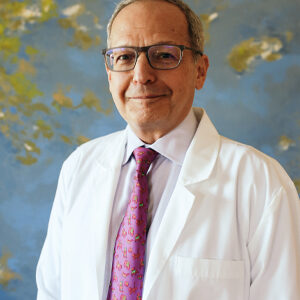 Chief Scientific Officer
Chief Scientific Officer
Sansum Diabetes Research Institute
Biography
Dr. Klein’s research activities are focused on understanding the mechanisms responsible for metabolic dysfunction associated with obesity and diabetes and the therapeutic effects of dietary manipulation on metabolic and health outcomes. He is also committed to training young investigators and clinicians in nutrition, obesity and diabetes and has provided mentorship to 45 trainees in clinical and translational research.
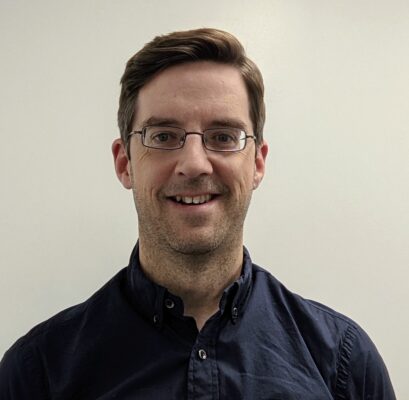 Assistant Professor
Assistant Professor
Department of Medicine, Division of Diabetes
UT Health San Antonio
Biography
Dr. Norton is interested in the discovery of novel molecular, metabolic and physiologic pathways in liver that contribute to the pathophysiology of type 2 diabetes and associated comorbidities such as obesity and non-alcoholic fatty liver disease (NAFLD). Currently, Dr. Norton’s laboratory is interrogating the role that mitochondria play in hepatic insulin resistance, and in how hepatocyte metabolic heterogeneity in liver regulates pathways of lipid metabolism, inflammation and fibrosis in NAFLD and NASH.
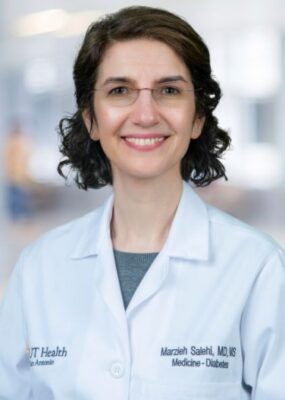 Associate Professor of Medicine
Associate Professor of Medicine
Department of Medicine, Division of Diabetes
UT Health San Antonio
Biography
Dr. Salehi is a board-certified endocrinologist with expertise as a clinician, translational investigator and educator in obesity, diabetes, and PCOS. She has been nationally recognized as clinician expert in glucose abnormalities, such as hypoglycemia, after bariatric surgery. Her research is funded by National Institute of Health, American Heart Association, and American Society of Metabolic and Bariatric Surgery focuses on incretin physiology and glucose metabolism, and particularly on glycemic effects of obesity and weight loss interventions such as bariatric surgery.
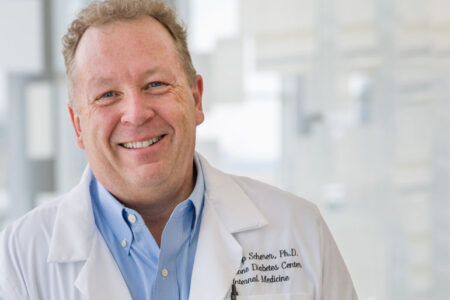 Director of the Touchstone Diabetes Center
Director of the Touchstone Diabetes Center
Professor, UT Southwestern Medical Center
Biography
Dr. Scherer’s laboratory’s main focus is the identification and physiological characterization of adipocyte-specific gene products and the elucidation of pathways that are an integral part of the complex set of reactions that drive adipogenesis. The hope is to unravel novel mechanisms and identify novel proteins that could serve as potential links between the adipocyte and the process of whole body energy homeostasis, thereby defining novel targets for pharmacological intervention and further define the role of adipose tissue as an endocrine tissue.

